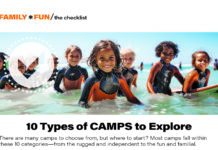Children with special needs can have a great summer at a camp that understands their specific needs and provides the proper support. The potential benefits likely outweigh the understandable anxieties parents may have about letting their child go for the day, week or multiple weeks.
“Campers with special needs get to try things out at camp and see how they fit. They get to feel like every other kid when their teacher asks if they went to camp and how it was. And it’s nice to meet other kids who are going through what they are going through. They can learn from each other and realize that — whatever problems you may have — somebody else has gone through them,” says Eileen M. Everly, MD, pediatrician at Karabots Pediatric Care Center, a CHOP Care Network primary-care practice in Philadelphia.
A successful camp experience just takes some planning and the right camp fit.
Ask ahead about accommodations for your child's special needs
When your child has special needs, you may have worries about him going to summer camp. Will someone remember to administer his meds? Can he navigate the camp facility? What if something unexpected occurs?
Dr. Everly suggests that parents ask specific questions about situations that may arise: “Who does your child tell if she needs her inhaler? Does the staff have multiple EpiPens or just one? Who would administer the emergency dose? And who will watch to ensure that it is effective?” Parents should get answers to such questions before camp starts and share them with their child so their camper can feel confident that she’ll get the care she needs while at camp. The very process of asking these questions and getting responses will help narrow the list of potential camps to those that can best accommodate a child’s unique challenges and make the summer a success.
How does the summer camp address children's physical challenges?
“The goal of camp is to make sure everyone is accommodated,” says Joan Hensel, executive director of Camp Manito in New Castle County and Camp Lenape, which serves both Kent and Sussex counties in Delaware. These camps, operated by United Cerebral Palsy of Delaware, Inc., accommodate children and young adults with orthopedic disabilities as well as campers without disabilities. Children without disabilities represent about 15 to 20 percent of the campers.
“We adjust the activities to accommodate the abilities of everyone,” Hensel notes. For example, each facility offers wheelchair-accessible paths and a swimming pool with an in-pool ramp. However, the camp’s inclusiveness allows siblings with and without physical disabilities to attend camp together. Hensel finds that “both populations benefit from exposure to one another” as they interact while swimming and during other traditional camp activities like arts and crafts, sports, music and computer enrichment.
To ensure campers can fully experience the activities, the camp conducts a thorough application process to get to know each camper. “The more we know, the more we can be prepared,” Hensel says.
Children with behavioral disabilities and autism can enjoy summer camp, too
Parents shouldn’t be afraid to encourage children on the autism spectrum or with behavioral disabilities to experience camp. Programs such as New Behaviors Explorer’s Club Summer Camp in Cherry Hill, NJ offer a safe environment and experienced staff ready to provide a positive experience for children and young adults with these challenges.
“We have non-verbal campers, very verbal campers and everyone in between,” explains Jennifer Schneyer, behavioral analyst for New Behavioral Network, which operates Explorer’s Club Summer Camp. The camp employs board-certified behavioral analysts who are ABA trained and well equipped to handle almost any challenge a camper could experience.
Campers engage in activities designed to develop social, coping and independent-living skills through sports, art, music and movement, science activities and off-site field trips.
“Camp is a great social-skills experience,” Schneyer says. “We try to provide as much fun as possible, tailored to the varying function levels of the campers.”
Summer camp activities for children with intellectual disabilities
Parents of children with intellectual disabilities may seek a program that helps campers build confidence, improve communication skills and become more physically fit. At Bournelyf Special Camp in Chester County, PA, the staff guide campers through swimming, hiking, camping, boating and horseback riding.
As always, the secret to a successful camp experience starts before campers even set foot onsite. “All prospective campers are required to take part in a walk-through tour and informal interview with the assistant director,” says Anne Catlin, executive director. The camp offers numerous open houses where first-time campers or families just starting to consider camp can meet with the assistant director to learn more about the camp’s programs and determine whether Bournelyf would be a good fit for an individual camper.
Catlin suggests that parents should bear in mind that not all kids will be ready for camp even if they reach the program’s age requirement. “Parents should take into consideration their child’s maturity, degree of independence, physical stamina and willingness to try new things to determine if that is the best age at which to send them to camp,” she says. “Sometimes waiting a year makes all the difference in the world between a positive and negative camp experience for a child.”
Andrea Rose is a freelance writer.






